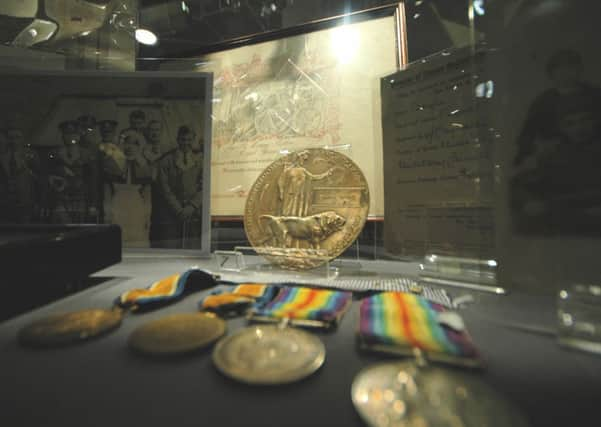Ballymena 1914 - Families at war


News of the arrival of a dreaded ‘official notification’ swiftly travelled along terraced streets or country lanes. And then there was the increasingly lengthy column of death reports in the avidly read weekly newspaper.
Individual fatalities were hard enough to bear but some families, in the parlance of the time, ‘did not have their sorrows to seek.’
Advertisement
Hide AdAdvertisement
Hide Ad‘Two brothers dead and one wounded’ ran the heading above this short article from the Ballymena Observer of April 16 1915.
“Information has been received in Ballymena that L.cpl. Robert Black, of the 2nd Btn. Highland Light Infantry, who was previously reported wounded and missing, is now reported killed. L.cpl. Black comes from Ballygarvey, Ballymena and his brother, Private W. Black, of the same regiment, was killed at the front some months ago. Another brother, Private Jerry Black of the Connaught Rangers, was wounded early in the war.”
It transpires that this was yet another example of a ‘final confirmation’ in Robert’s case. In fact, Robert had fallen in October 1914 while his his brother, William, had been killed three weeks later. Neither body was recovered and they are commemorated on the Menin Gate Memorial at Ypres, the town at the heart of the bloody salient which the British defended at all costs throughout the war.
Often the man who sent home news of a relative’s death was soon to find himself of the list of the fallen. This was certainly in the case of cousins James and Daniel McFall, both pre-war recruits to the 2nd Btn. Royal Irish Rifles. The Ballymena men would have joined the Rifles around the same time as a famous chronicler of the battalion’s role in the Great War, John Lucy, whose autobiography, ‘There’s a devil in the drum’ is rightly regarded as a classic account.
Advertisement
Hide AdAdvertisement
Hide AdThe McFalls took the King’s Shilling in late 1913 and both had been at the front since the outbreak of war.
James was killed on May 8, after his battalion had been involved in several days of fighting around the notorious Hill 60, a byword for slaughter, even in the context of the evil reputation of the Ypres Salient.
Cyril Falls writes of this period:-
On May 6, 1915, the Battalion was ordered to march to a point north of Hill 60 and relieve the Bedfords of the 13th Brigade. The relief was carried out amidst considerable confusion. The guides led the Battalion from the ill-famed Shrapnel Corner, on the Ypres - Wytschaete road, along the side of the Zillebeke Lake, in single file, amid falling shells, by a path littered with the wounded and gassed, whose stretcher-bearers had been forced to set them down for a few moments’ rest to their aching arms.
Having lost their way more than once, they reached Dormy House, the Battalion headquarters, at 1.30 a.m. on the 7th.[May 1915]. A bombing attack to clear a communication trench held by the enemy had been planned for 2.30am.
Advertisement
Hide AdAdvertisement
Hide AdFather Gill, the Battalion’s chaplain, who describes the relief, states that he saw the scheme on the back of an envelope. The men were not in position till ten minutes before that hour, utterly wearied already.
Moreover, the barricade, which was supposed to have been mined, did not “go up,” and the bombers were met by heavy fire from it. The attack failed with heavy loss, Captain Burgoyne and Lieutenant Leask being wounded, and of other ranks 9 killed and 16 wounded.
Next day there was further violent fighting at Hooge in which the Battalion was involved only to the extent of some bomb-throwing. It lost Captain V. Gilliland killed, 2nd-Lieutenant G. W. Webb wounded, and had 12 other casualties.
Young James McFall was one of the 12 ‘other casualties’ of that fight. His cousin Daniel passed word to his family in Ballymena and on May 26, the Observer dutifully reported:-
Advertisement
Hide AdAdvertisement
Hide Ad“Intimation of the death of Private James McFall, Dunfane, Ballymena has been received. Private McFall joined the Royal Irish Rifles about 18 months ago and went into action with his regiment. News of his death was received from his cousin who is also at the front.” Ballymena Observer, May 21, 1915.
Just two months later, it was Daniel’s turn to die. The circumstances of his demise are less clear and it is possible that he was merely another victim of the daily grind of hate on the Western Front . There is no mention of any major action for the date of his death but the Rifles were under regular shelling and sniper fire at the time. Again, the Observer reported:-
MRS. Rosetta McFall, Garfield Place, Ballymena, has received official notification that her third son, Pte Daniel McFall 2nd Btn R.I. Rifles has been killed in action in France. Deceased, who was only 19-years-old, enlisted towards the end of 1913 and was about nine months at the front when killed. His cousin, James McFall, who was in the same regiment, was also killed in action recently. Ballymena Observer, July 30, 1915
The McFall boys are both commemorated on the Menin Gate. It was not the end of suffering for the extended family. James’ older brother, another Daniel, was killed on July 2, 1916 while serving with the 8th Btn. Royal Irish Rifles, 36th (Ulster) Division, at the Somme. He is commemorated on the Thiepval memorial.